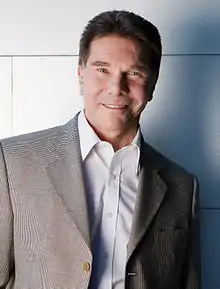Robert Cialdini
Robert Beno Cialdini (born April 27, 1945) is the Regents' Professor Emeritus of Psychology and Marketing at Arizona State University and was a visiting professor of marketing, business and psychology at Stanford University, as well as at the University of California at Santa Cruz.[1][2]
Robert Cialdini | |
|---|---|
 | |
| Born | April 27, 1945 |
| Occupation | Psychologist, Author, Speaker, Professor |
| Children | Christopher Cialdini |
Education
Cialdini received his Bachelor of Science degree from the University of Wisconsin - Milwaukee[3] in June 1967. He then went on to Graduate studies in Social Psychology at the University of North Carolina and earned his Ph.D. in June 1970 and received Postgraduate training in Social Psychology at Columbia University. He has held Visiting Scholar Appointments at Ohio State University, the University of California, the Annenberg School of Communications, and the Graduate School of Business of Stanford University. Currently, Cialdini is Regents’ Professor Emeritus of Psychology and Marketing at Arizona State University.[4]
Work
He is best known for his 1984 book on persuasion and marketing, Influence: The Psychology of Persuasion. It was based on three "undercover" years applying for and training at used car dealerships, fund-raising organizations, and telemarketing firms to observe real-life situations of persuasion. He found that influence is based on six key principles: reciprocity, commitment and consistency, social proof, authority, liking, scarcity.[5] In 2016 he proposed a seventh principle. He called it the unity principle. The more we identify ourselves with others, the more we are influenced by these others.[6]
The book has sold over three million copies and has been translated into thirty languages.[7] It has been listed on the New York Times Best Seller list and Fortune lists it in their "75 Smartest Business Books".[8] It is mentioned in 50 Psychology Classics.[9][10]
One of Cialdini's other books, Yes! 50 Scientifically Proven Ways to Be Persuasive, was a New York Times Bestseller; and another of his books, The Small BIG: Small changes that spark a big influence, was a Times Book of the year.[11] Cialdini's most-recent book is Pre-suasion, which was published in 2016.
The Robert B. Cialdini prize from the Society for Personality and Social Psychology is named after him in honor of psychological research that demonstrates societal relevance using field methods.[12] He was elected a member of the National Academy of Sciences in April 2019.[13]
Projects
Cialdini was hired alongside many other behavioural scientists for the Barack Obama presidential campaign, 2012.[14] He also advised in the early stages of the Hillary Clinton presidential campaign, 2016.[15][16]
Selected publications
- Cialdini, R. B. (1984). Influence: The Psychology of Persuasion (ISBN 0-688-12816-5). Also published as the textbook Influence: Science and Practice (ISBN 0-321-01147-3).
- Cialdini, R. B. (2001). Influence: Science and practice (4th ed.). Boston: Allyn & Bacon. ISBN 978-0-205-60999-4.
- Yes! 50 Scientifically Proven Ways to be Persuasive. Authors: Noah J. Goldstein, Steve J. Martin and Robert B. Cialdini. Simon and Schuster, 2008, ISBN 978-1-4165-7096-7.
- The Small BIG: Small changes that spark a big influence, 2014.
- Cialdini, R. B. (2016). Pre-Suasion: A Revolutionary Way to Influence and Persuade. New York: Simon & Schuster. ISBN 978-1501109799.
References
- University, Arizona State. "ASU Staff Directory: Robert Cialdini". ASU.EDU. Retrieved June 29, 2015.
- University, Stanford. "ASU Staff Directory: Bob Cialdini". Stanford.EDU. Retrieved July 29, 2015.
- "Award Recipients | Alumni". Retrieved 2019-10-30.
- Cialdini, Robert. "Curriculum Vitae" (PDF). Robert Cialdini Bureau Friendly. Retrieved 29 July 2015.
- Cialdini, Robert (2009). Influence: Science and Practice. Boston, MA: Pearson Education. ISBN 978-0-205-60999-4.
- Cialdini, R. B. (2016). Pre-Suasion: A Revolutionary Way to Influence and Persuade. New York: Simon & Schuster. ISBN 978-1501109799.
- Josephson, Brady (April 22, 2015). "6 Principles of Influence You Can Use For Your Cause". Huffington Post. Retrieved June 29, 2015.
- Useem, Jerry (March 21, 2005). "The Smartest Books We Know – March 21, 2005". Money.cnn.com. Retrieved January 27, 2013.
- Schaefer, Mark (2012). Return On Influence. McGraw-Hill.
- Butler-Bowdon, Tom (2010). 50 Psychology Classics. Boston, MA: Nicholas Brealey Publishing. p. 62. ISBN 978-1-85788-386-2. Retrieved June 29, 2015.
- New York Times. "New York Times Best Seller List October, 2008". NewYorkTimes.com. New York Times. Retrieved 29 July 2015.
- "Cialdini Prize". SPSP.
- "2019 NAS Election". National Academy of Sciences. April 30, 2019.
- https://www.nytimes.com/2012/11/13/health/dream-team-of-behavioral-scientists-advised-obama-campaign.html
- https://www.theguardian.com/business-to-business/2018/mar/09/how-to-persuade-people-hint-not-by-telling-them-theyre-stupid
- Kellaway, Lucy (6 September 2016). "Persuasion tactics fit for a presidential campaign: Psychologist and business book author Robert Cialdini on how to sway people". FT.com. The Financial Times Ltd. Retrieved 15 October 2019.
I rang Mr Cialdini to ask if he was helping Mrs Clinton, what he did in the moment before he replied struck me as unusually important. This amounted to a longish pause, and an intake of breath. Very slowly he said: “It’s my policy not to speak about any campaign that’s ongoing. The emotions are too deep.”